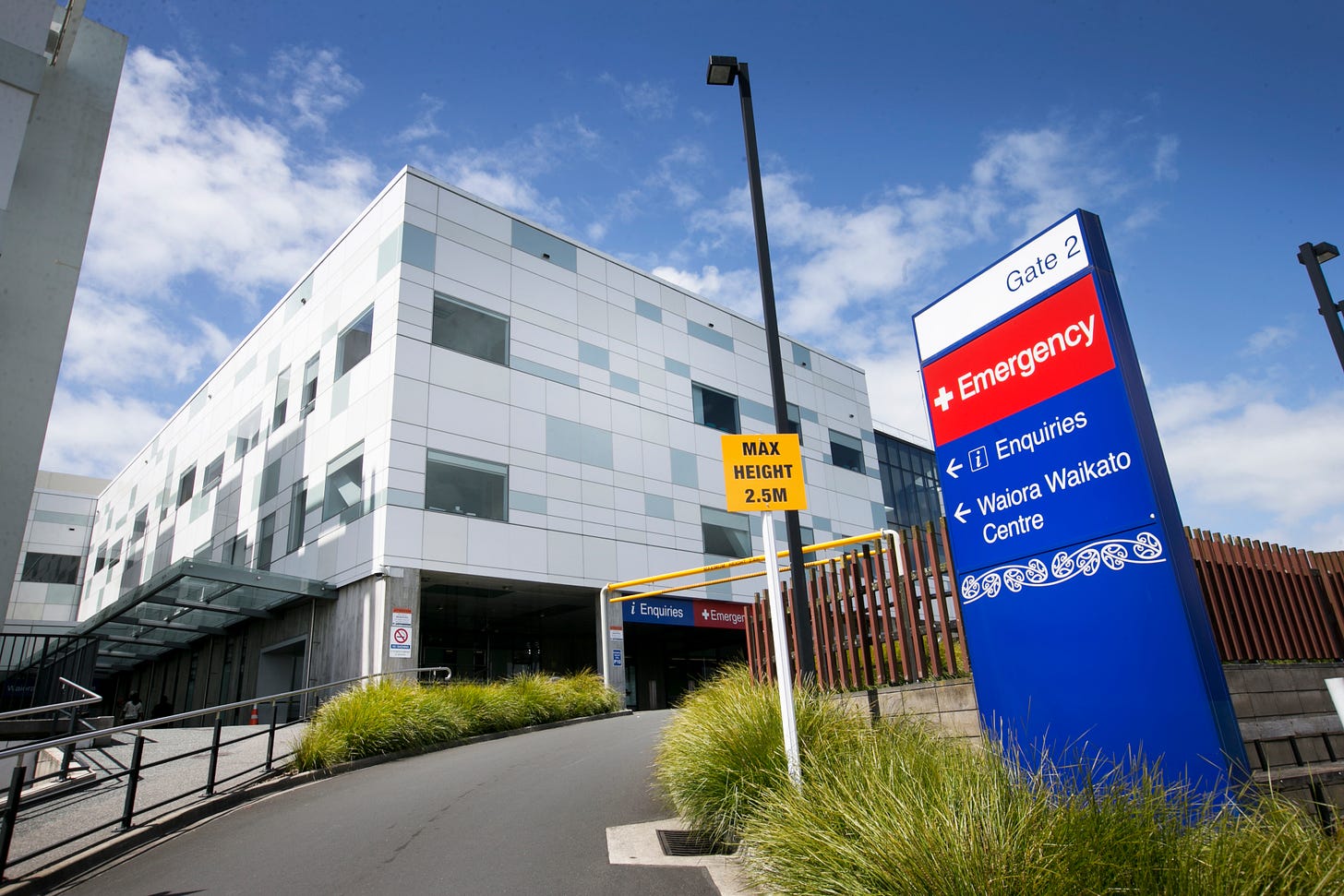This week, I received a comment from one of my subscribers, whom I will refer to as KC. She wanted to share what happened to her on Tuesday when she tried to access urgent medical care through our public health system. Her story deserves to be told because it paints a grim picture of what New Zealanders now face when they fall seriously ill.
KC’s story
On Tuesday afternoon, she phoned her GP because she couldn’t physically make it to the clinic. She suffers from severe dizziness, heart fluttering, chest pain, shortness of breath, and COPD. After describing her symptoms, her doctor told her to go straight to the hospital. He suspected a serious issue with her heart or lungs and sent a referral to Waikato Hospital. Her husband called an ambulance, and St John staff did two ECGs - one at home and one on the way, both showing irregular heart activity.
Before they even reached the hospital, her husband received a call from the medical centre saying the hospital’s cardiology department was “too busy.” She would instead be sent through A&E. What he wasn’t told was that the GP’s referral letter stated she had “Atrial Fibrillation.”
The long wait begins
When she arrived at Waikato Hospital, she waited 35 minutes in the ambulance before being moved into triage. The ambulance bays were full. Once inside, she waited again while the “handover” happened. Two Māori men nearby were laughing and joking loudly. They even directed their remarks toward her. She ignored them, but the lack of privacy and dignity was clear from the start.
Eventually she was placed in the waiting area, which was packed. Most people weren’t alone. They were chatting, eating from vending machines, and laughing, seemingly there for anything but emergencies. “Why are they here at A&E meant for sick people?” she wondered. She sat in that chair for three hours, never once seen by a doctor.
Three nurses, no doctors
Over those three hours she was approached by three different nurses, each taking her into a private room for tests, an ECG, a blood test, then another ECG. All were foreign nurses. One, with broken English, asked if the fading insect bites on her ankle were why she had come to A&E. That question alone made her question how such people were being registered to work in New Zealand hospitals.
By the time her husband arrived, she’d already decided to give it another 45 minutes. When no doctor appeared, she told staff she would leave. She was offered her blood test results. One hormone was low, calcium normal, but still no medical assessment. Dinner had been a dry sandwich, inedible for a diabetic who needed real food to take insulin. She left at 8:12 p.m. exhausted, hungry, and without answers.
She left a comment early Thursday morning, still wheezing, dizzy, and struggling to breathe. Her message ended with a chilling line: “I’ve told hubby to refer to this message should I suffer a stroke or heart attack.”
Our health system is stretched to breaking point, where seriously ill people are triaged behind those who shouldn’t even be in emergency departments, and where foreign staff with questionable communication skills are filling the roles Kiwis once proudly held.
When people start writing messages like this, just in case they don’t make it, you know something is deeply wrong with our country’s priorities.
Labour can promise all the free doctor visits it wants, but when even urgent cases cannot get seen by a doctor, “free” means nothing.
Thanks KC for sharing your story. I’ve added an extra three months to your subscription, on me. - Matua
Introducing Subscriber Stories, my new Saturday series where I share your stories. My publication reaches hundreds of thousands of readers each month, so if you have a story worth telling, I am happy to help. Not only will your story be read by thousands, but as a thank you, you will also receive a three-month free paid subscription as a little thank you.






As many of you know, Saturdays, or Satireday as I used to call them, were usually when I’d post something light-hearted and satirical if the week had given me enough material to poke fun at. I’ve decided to ease up on doing them regularly, mainly because too many people seem to miss the satire completely, and honestly, I end up feeling second-hand embarrassment for them.
So instead, I’m thinking Saturdays could be reserved for subscriber stories like this one. This publication reaches hundreds of thousands of readers each month, so if you’ve got a story you’d like to share and can give me the details I need to build it properly, I’ll publish it. You can choose to stay anonymous, or I can include your Substack handle or socials if you’d like. Just send me a private message - this is open to all my paid Subscribers.
Not only that, if I publish your story, I'll give you an extra three months of paid subscription free,
Thank you to everyone who commented here. And a very special thank you to Matua Kahurangi for publishing my story, and, gifting me 3 months membership! All of your kind thoughts and shared experiences touched me deeply. I felt great sadness too when reading the experiences of so many others who have been through even worse situations than I have. I honestly felt somewhat selfish after having complained about what I went through at Waikato Hospital. But a problem shared is a problem halved they say, and I certainly benefitted mentally from doing this.
Something I forgot to let Matua Kahurangi know was that there were 2 tv screens in the large space that forms the Waikato Hospital A & E waiting area. (I must note here that they have more than doubled this area since I last had to visit there, and this made me question why they significantly increased the number of chairs for people waiting to be seen by a doctor but they did not increase the number of beds for people waiting to be treated by a doctor. Answer to this one I concluded was because there is a dire shortage of doctors working in our state hospitals).
One of the abovementioned tv screens repeated a written message every couple of minutes that tried to describe what an "emergency" case might look like (e.g. a bone sticking out of flesh ... duh!), and, then went on to inform viewers that they could ask for a voucher at the front / reception desk for an external (privately owned and operated) A & E in Hamilton (the clinic was not named but there is only one in this city that is open 24x7).
No-one approached the front / reception desk to ask for a voucher during the 3 hours* I was seated, in a very uncomfortable wheelchair, in the A & E waiting area. Which got me thinking that the free vouchers ought to be handed out - not merely offered through a tv screen message - to those who arrive at the Waikato Hospital A & E and are subsequently triaged as Category 5 (according to a Google search this is "Chronic or minor condition. Can be assessed and treated within two hours" - * my wait exceeded three hours so a 50% increase in waiting time). According to my calculations that would really hasten the speed at which genuine (Category 1, 2, 3 and 4) cases are seen by a doctor. In this regard I plan to ask Waikato Hospital - through an OIA request - how many of the A & E patients have been triaged as Category 5, and, how many requests have been made for vouchers, over certain time-frames. Watch this space for their response.
Another point is I immediately sent an e-mail message to my GP after arriving home following my self-discharge. I had given the St John ambulance people a list of the blood tests I believed would shed at least some light on may be contributing to, if not causing, my distressing symptoms, and, one of them had used his mobile to take a snapshot of this document which was then handed over to the A & E triage Nurse after I got taken into the hospital building following a 35 minute ambulance wait outside. I referred to that list, and repeated the blood test names, when I was wheeled into a small private room by a Nurse that was just off to one side of the A & E waiting area, and, where I was told she wanted to do blood tests. I asked which ones and was told PTH (parathyroid gland) and Calcium. I had surgery in February this year to remove 3 of the (normally) 4 from my neck, and, have had check ups since then to ensure that aforementioned blood test levels are okay ... which they have been. I told the blood test Nurse this and that there was a list of blood tests, etc. handed over to the A & E triage Nurse by St John. I also again named them. She refused to do any one of them, did not go back to the doctor who had seemingly ordered the PTH and Calcium ones with this new information, and went ahead with only the two aforementioned tests. In other words, she made a decision that she was not qualified to make!
My GP did an urgent blood test form for me the following morning. He, gratefully, included all of the ones I had repeatedly said I believed would be helpful. The results were:
1. Albumin = Low
2. Creatinine - High
3. Ferritin = Low
4. Haemoglobin = Low
5. HCT = Low
6. B12 = Low
The "cherry on the top" was being told before I self-discharged that my PTH test result showed a "Low" and finding out from the blood tests that my GP this was not the case at all. My husband was standing right beside me when a Nurse told me this result. He, like me, has very clear recall of what she said.
Doctors and Nurses who do not listen to patients are, in my opinion, dangerous people. Had I not been as unwell as I am I would have argued the point about the blood tests but I simply did not have the physical or mental stamina to do this. My dear departed Father used to say; "Doctors bury their mistakes". Today I think this is more a case of "Doctors and Nurses bury their mistakes" since so much responsibility is heaped on Nurses.
In conclusion, it is pointless complaining to the Health and Disability Commissioner because not only is this agency swamped with complaints from justifiably aggrieved patients but this office is a "toothless dog" since it has no authority to order any sort of changes to be made, much less grant compensation to victims of a health system that is itself in need of urgent resuscitation.